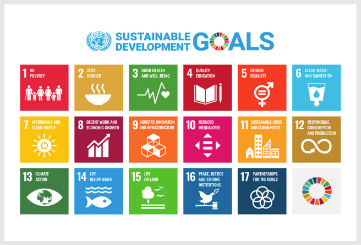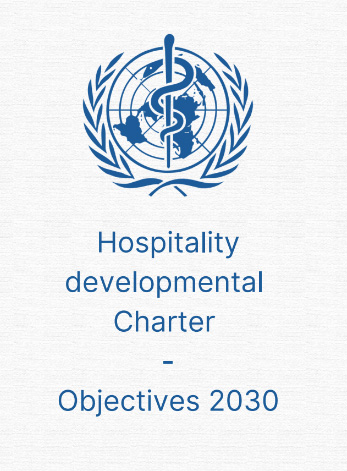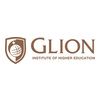Health and well-being for a healthy hospitality - A United Nations Panel
By Arianna Luci, Denise Angela & Emmanouil Ntoumas

The following publication is part of a series of 7 pieces prepared by Glion's IHB Masters students during a one-day workshop aiming at highlighting the potential of the hospitality industry to contribute to the achievement of the UN SDGs by 2030. All figures, data and initiatives are fictitious and were created by students in the context of an immersive and transformative learning experience where students generated ideas and propositions that transcend the conventional thanks to the simulation of a professional conference taking place in 2030.
Learn more about the workshop at Glion here.
This piece focuses on SDG 3, Good health and wellbeing. With a discussion between international hotel group leaders and a UN representative, students addressed the following 3 issues: healthcare and insurance, work-life balance and mental health. Thanks to initiatives like financing healthcare facilities in less developed countries and islands, developing on-site childcare for employees and facilitating the access to psychological support for their employees, hotel groups became more attractive for employees and contributed to significant progress in physical and mental health in general. These propositions show the diversity of leverages for hotel groups as well as the vision of future leaders for an industry that truly cares for its people.
--------
Only 10 days to the Global World UN Summit on 2030 goals, the Hospitality Inside team had the chance to be invited to the SDG Hospitality Summit in Geneva. Today’s panel primary focus was to assess the accomplishments and advancements made in relation to Sustainable Development Goal 3 (SDG 3), which aims to ensure healthy lives and promote overall well-being for individuals of all ages.
 As it was established, each week all the delegates from each country are going to meet and discuss over one specific panel covering one Sustainable Development Goal (SDG), and that of today was related to the third Goal of the list, which aimed to ensure healthy lives and promote well-being for all at all ages. Today’s meeting was impressively positive, as it revealed most of the goals that were established on September 25, 2015, by the United Nations General Assembly, were met at least in regards to the hospitality world.
As it was established, each week all the delegates from each country are going to meet and discuss over one specific panel covering one Sustainable Development Goal (SDG), and that of today was related to the third Goal of the list, which aimed to ensure healthy lives and promote well-being for all at all ages. Today’s meeting was impressively positive, as it revealed most of the goals that were established on September 25, 2015, by the United Nations General Assembly, were met at least in regards to the hospitality world.
As highlighted by mediator William Wehrenberg, the global COVID-19 pandemic, at its peak in 2020/2021, compelled hospitality organizations worldwide to innovate strategies focused on health and well-being. With the risk of reputational damage for non-compliance with hygiene regulations, the industry intensified its sustainability efforts. The hospitality industry, once criticized for lagging in sustainability practices, has emerged as a leader in health and well-being sustainability.
The need to significantly expand health financing and improve the recruitment, development, training, and retention of the health workforce in developing nations, especially in least developed countries and small island developing states, was one of the main issues encountered. Leading these initiatives, the hospitality industry has prioritized the provision of improved medical facilities and sanitation access for both its staff and visitors in these areas.
 In the quest to improve the health and well transformation has taken place since 2015. Through a collaborative effort between firms, governments, and the World Health Organization (WHO), significant advancements have been made in expanding health coverage, implementing best practices, addressing mental health concerns, and reducing the socioeconomic impact on workers' well-being. As explained by Cassandre Touflet - Hospitality industry representative for the World Health Organization, in 2015 only 32% of hospitality workers had access to health coverage. However, by the year 2030, this percentage skyrocketed to 80%, reflecting a momentous shift in ensuring the well-being of employees. This accomplishment was made possible through the collaborative efforts of various stakeholders, including governments, healthcare providers, and the WHO.
In the quest to improve the health and well transformation has taken place since 2015. Through a collaborative effort between firms, governments, and the World Health Organization (WHO), significant advancements have been made in expanding health coverage, implementing best practices, addressing mental health concerns, and reducing the socioeconomic impact on workers' well-being. As explained by Cassandre Touflet - Hospitality industry representative for the World Health Organization, in 2015 only 32% of hospitality workers had access to health coverage. However, by the year 2030, this percentage skyrocketed to 80%, reflecting a momentous shift in ensuring the well-being of employees. This accomplishment was made possible through the collaborative efforts of various stakeholders, including governments, healthcare providers, and the WHO.
 The WHO, after the release of the different SGDs, decided to take part by helping every industry grow into a framework for a healthy and sustainable future. On the 23rd of December 2023, the organization published the ‘Hospitality developmental charter - Objective 2030’. This framework set the basic rules needed for the employees, managers and top leaders to grow their career in a healthy way: 5 days of work per week, nurses on site, as well as adapted health and prevention campaigns within the industry. This framework is now the basis of many initiatives in the industry: as mentioned by Basile Hervé, CEO of Hilton Worldwide during the panel, ‘Thanks to this charter, we developed several programs for our employees to feel better at Hilton. We now have period leaves - which represent 2 days/month, as well as feminine care in every bathroom of our hotels. We also decided to prioritize efficiency over work-time, and that is why our teams can choose between a 4 or 5 day work week’. - Charter available on the UN Global Website.
The WHO, after the release of the different SGDs, decided to take part by helping every industry grow into a framework for a healthy and sustainable future. On the 23rd of December 2023, the organization published the ‘Hospitality developmental charter - Objective 2030’. This framework set the basic rules needed for the employees, managers and top leaders to grow their career in a healthy way: 5 days of work per week, nurses on site, as well as adapted health and prevention campaigns within the industry. This framework is now the basis of many initiatives in the industry: as mentioned by Basile Hervé, CEO of Hilton Worldwide during the panel, ‘Thanks to this charter, we developed several programs for our employees to feel better at Hilton. We now have period leaves - which represent 2 days/month, as well as feminine care in every bathroom of our hotels. We also decided to prioritize efficiency over work-time, and that is why our teams can choose between a 4 or 5 day work week’. - Charter available on the UN Global Website.
The hotel sector has implemented progressive policies including childcare help, maternity/paternity leave, work-life balance measures, and initiatives like period leave in recognition of the importance of family and personal care. In order to enable workers to maintain a healthy work-life integration, it has been a goal to ensure that everyone has access to family planning, education, and sexual and reproductive health care.
Additionally, strong focus has been placed on training and awareness at all levels, emphasizing prevention. By equipping employees with the necessary knowledge and skills, the industry succeeded at creating a culture of well-being and prioritizing proactive measures to address potential health risks.
The hospitality industry also finally recognized the importance of mental health awareness and preventing burnouts. In 2023, disturbing statistics indicated that a significant portion of employees faced verbal abuse from customers, while a substantial number required medical or psychological assistance. To combat this, efforts have been made to provide mental health support, training, and access to mentors, health champions, and mental health first aiders. By providing education on stress management techniques, time management skills, and work-life balance strategies, individuals were able to learn how to recognize the signs of burnout early on and take steps to prevent it from becoming a chronic condition. At the organizational level, employers started providing training and resources to their employees on these topics as well as promoting a culture of wellness that prioritized mental health. This included offering flexible work arrangements, encouraging breaks throughout the day, and providing access to mental health resources such as counseling or therapy.
Burnout is a state of complete mental, physical and emotional exhaustion caused by an intense pace in work-life.
In regards to the societal level, public education campaigns that promote mental health awareness helped reduce the stigma surrounding mental health issues and encouraged individuals to seek support when needed. By increasing awareness about the signs of burnout and how to prevent it from occurring in the first place, it was possible to create a healthier workforce and society overall. As of today, significant improvements have been made: as explained by Ms Touflet, the percentage of Hospitality workers experiencing burnout at work decreased from 46% in 2015 to 12% in 2030. In the same window of time, suicide rates from employees within the industry have also dropped steadily by almost 20 percent, showing that the measures that were adopted were particularly effective to improve the situation.
An interesting example was Mr Basile Herve, CEO Hilton Worldwide, who explained how his company was able to place utmost importance on taking care of employees' basic needs. Understanding the long hours and intensity of working in the hospitality sector, the company has implemented solutions to ensure staff members' well-being. These include promoting breaks during shifts, creating rotas and shift patterns that avoid back-to-back double shifts, and facilitating the effective utilization of days off and holidays.
Hilton strived to cultivate work environments where employees feel comfortable openly discussing their mental health, aiming to challenge the stigma associated with mental health in the workplace. The company has achieved remarkable success in fostering a safe environment that respects confidentiality, privacy, and active listening to employees' concerns worldwide. To support this initiative, leaders, managers, and team members received training to enhance their skills in supporting their own and others' mental health.
Overall, the initiatives undertaken by Hilton have made a tangible impact on employee well being across its global properties. By placing a strong emphasis on meeting basic needs, promoting open dialogue on mental health, and implementing comprehensive mental health policies, Hilton continues to demonstrate its commitment to creating a supportive and inclusive work environment.
This summit summed up the growing awareness of healthcare and mental care in the hospitality industry: from a shortage of staff in 2022, the industry has been able to shift in order to become attractive for workers.
Thanks to various regulations and governmental actions, groups and actors of the industry were encouraged to implement new programs, taking care of their employees.
As of today, our growing industry managed to reach the goals set in 2015, by using different means. At Hospitality Insider, we are proud to be part of the movement, and we do believe that a long-lasting commitment to the cause will bring the industry to a bright future.
*Article by Arianna Luci, Denise Angela & Emmanouil Ntoumas
About Glion Institute of Higher Education
Founded in 1962, Glion Institute of Higher Education is a Swiss institution offering bachelor's, master's and executive degrees in hospitality, luxury and finance to an international student body across three campuses in Switzerland and London, UK.
Glion ranks number six among the world's top higher education institutions for hospitality and leisure management in the 2025 QS World University Rankings by Subject. It also holds number three globally in employer reputation, highlighting its strong industry recognition and ability to meet employer expectations.
Part of the Sommet Education network, world leader in education and training in hospitality, luxury and culinary arts. Glion has received official recognition from the Swiss Accreditation Council (SAC) as a Swiss University of Applied Sciences Institute. In addition, Glion is also accredited by the New England Commission of Higher Education (NECHE).
For more information, visit https://www.glion.edu/












